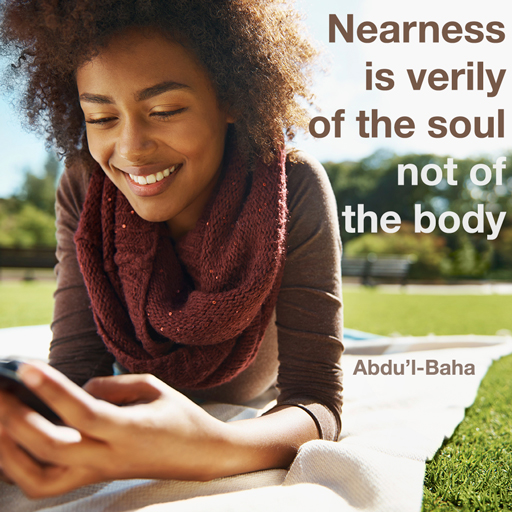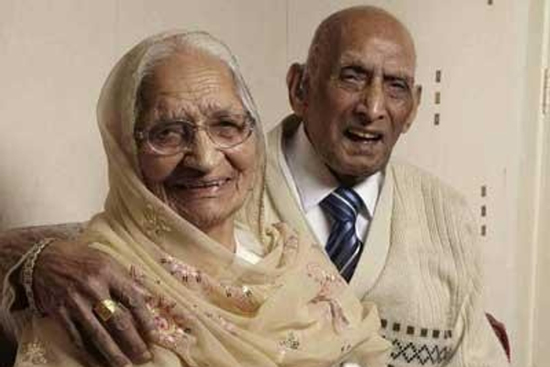The views expressed in our content reflect individual perspectives and do not represent the authoritative views of the Baha'i Faith.
Interested in a long-term relationship? And I mean really long-term…
Karam Chand and Kartari Chand, from Bradford, England, have been married for almost 89 years. They’re only two years away from breaking the world marriage longevity record of 91 years, still held by the late Daniel and Susan Bakeman of Freedom, New York.
Daniel, the last surviving Revolutionary War veteran, and his wife Susan Brewer, had eight children. The Bakemans both passed away during the mid-1800s and their incredibly long-lasting union still tops the charts—the only recorded marriage in human history that ever exceeded ninety years. If you want to talk about a serious long-term relationship, those awe-inspiring numbers from the Bakemans and the Chands may stay in the record books for a while.
Why? Well, for one reason, people used to marry much earlier than they do now. (And stay married much more often, too.) In the past, and still today, in a dwindling number of the world’s cultures, marriages typically occurred somewhere near puberty. When the Bakemans married in 1772, he was 12 and she was 14.
If you get an early start, I suppose, your long-term relationship possibilities go way up. (I wouldn’t recommend starting that early, though.)
Just about everyone wants a long-lasting, happy union with someone they love. But how, in this age of divorce and dissolution, do we create sustainable relationships?
I had good role models in that regard. My grandparents’ marriage spanned 73 years. They almost got to their 75th wedding anniversary, but my grandfather died at 106. My parents’ marriage lasted 63 years before my mother, bless her loving heart, passed away at 84 years old. By comparison, my sweet wife and I seem like we’re just getting started—we’re only in our 24th year of marriage.
Because of that long familial history of committed, loving relationships, I’ve always had enormous curiosity and interest in what keeps relationships going. Watching my own parents, whose long-term relationship began in their early twenties and lasted for a lifetime, made me ponder the nature of love and commitment and patience and the ability to resolve differences–and maybe most importantly, how to stay married through thick and thin, feast and famine, better and worse.
So, for this series of articles, we’ll look at the research and talk to some experts to try and find out the five most important keys to sustaining LTRs—long-term relationships—and how to find and sustain one.
When you review the literature on the subject, you learn that experts (and by experts I mean people who have happily stayed in their relationships for many decades) generally agree—successful LTRs have five major components:
1. Love
2. Character
3. Equality
4. Parental support
5. Faith–and faithfulness
That first essential element—love—seems pretty obvious, right? Hardly anyone marries without feeling love for their partner, although exceptions do exist.
But love can take many forms, and almost every couple with a successful long-term relationship will tell you that mere physical attraction, the passionate physical and sexual love many societies tend to emphasize, just isn’t enough by itself to sustain them over the long term. Our high divorce rates prove that pretty conclusively. It’s easy to initially mistake the first euphoric feelings of romance and attraction for love, and then realize, as the blame and the break-up loom, that the love you thought you felt has faded all too quickly.
When you’re young and healthy, and the mating urge is strong, it’s often easy to think that the magnetic allure you feel is true love—but that powerful magnetism can fool you. We know scientifically that the initial flush of hormonal response, romance and sexual attraction two people feel for each other has a fairly short lifespan. Studies have shown that the serotonin, cortisol and oxytocin produced by falling in love diminish in the bloodstream over time.
 Also, scientists have recently learned that the human body manufactures high levels of a recently-discovered protein molecule known as nerve growth factor(NGF) when people first fall in love–but then the NGF levels slowly decrease and return to normal after approximately a year. Maybe that’s why we call it “chemistry” when we feel attraction for another person—our minds and bodies actually produce the hormones and proteins that give us strong chemical reactions to the object of our affections.
Also, scientists have recently learned that the human body manufactures high levels of a recently-discovered protein molecule known as nerve growth factor(NGF) when people first fall in love–but then the NGF levels slowly decrease and return to normal after approximately a year. Maybe that’s why we call it “chemistry” when we feel attraction for another person—our minds and bodies actually produce the hormones and proteins that give us strong chemical reactions to the object of our affections.
So now we know, scientifically, that in order to last, the love a couple feels for each other must have a deeper, more spiritual source:
Nearness is verily of the soul, not of the body… nevertheless it is my hope that thou wilt attain to nearness in every sense. – Abdu’l-Baha, Selections from the Writings of Abdu’l-Baha, p. 182.
The Baha’i teachings say that love, in order to last, has to originate in the heart and soul, not just in the chemistry you feel when Cupid comes calling.

















Comments
Sign in or create an account
Continue with Googleor